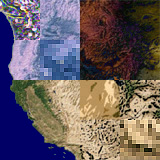New Digital Cultures Project members:
Mark Goble and Lisa Parks
June 13, 2002
Mark Goble, Assistant Professor of English, UCI
Mark is a recent graduate of Stanford’s English department,
has just accepted a job in the Department of English and Comparative
Literature at UCI. Mark’s work is focused on the relationship
between American modernism and the history of media. His dissertation
is entitled, “Beautiful Circuits: the Mediated Life in America,
1900-1940.” It looks at, in his own words, “the aesthetics
and performance of communication in literature at a time when the
once “new media” of the telegraph, telephone, phonograph
and cinema, were becoming commonplace in everyday life.” Informed
by the German study of “media materialities” (Kittler,
et al), Mark’s dissertation demonstrates the many ways that
literature, in spite of its claim to aesthetic autonomy, has always
been embedded in the complex mediations between and among print
media and new non-print media.
Lisa Parks, Associate Professor of Film Studies, UCSB
Lisa has recently completed a book that offers a striking way to
reinterpret TV in light of the satellite technologies that underlie
its global reach. Here is a brief description of that book, Cultures
in Orbit: Satellite Technologies and Visual Media (forthcoming from
Duke UP)
“This work defines a field of “satellite media”
which includes satellite broadcasts, remote sensing/satellite surveillance
images, astronomical images, and global positioning maps. Through
a range of case studies, I develop a theoretical framework for analyzing
satellite media from a critical studies perspective. I draw on a
range of materials including NET, UNESCO and NASA archival documents,
international satellite television broadcasts, satellite ‘development’
projects, documentary films, remote sensing images, World Wide Web
sites, popular cultural texts, and mainstream press articles. I
discuss such topics as the first global live-via-satellite television
program Our World, electronic nation-building and the Satellite
Television Experiment in India, Australian Aboriginals’ tactical
use of satellite technology to counteract forces of globalization,
and STAR TV’s remapping of cultural boundaries in East Asia.
Ultimately, the project traces the specific ways in which satellites
have extended the power to see and know, reconfigured temporal and
spatial relations that inform our sense of the ‘historical’
and the ‘global,’ and forged new transnational cultural
alliances and antagonisms.”
Please join me in welcoming these talented younger scholars to
the group.
|

